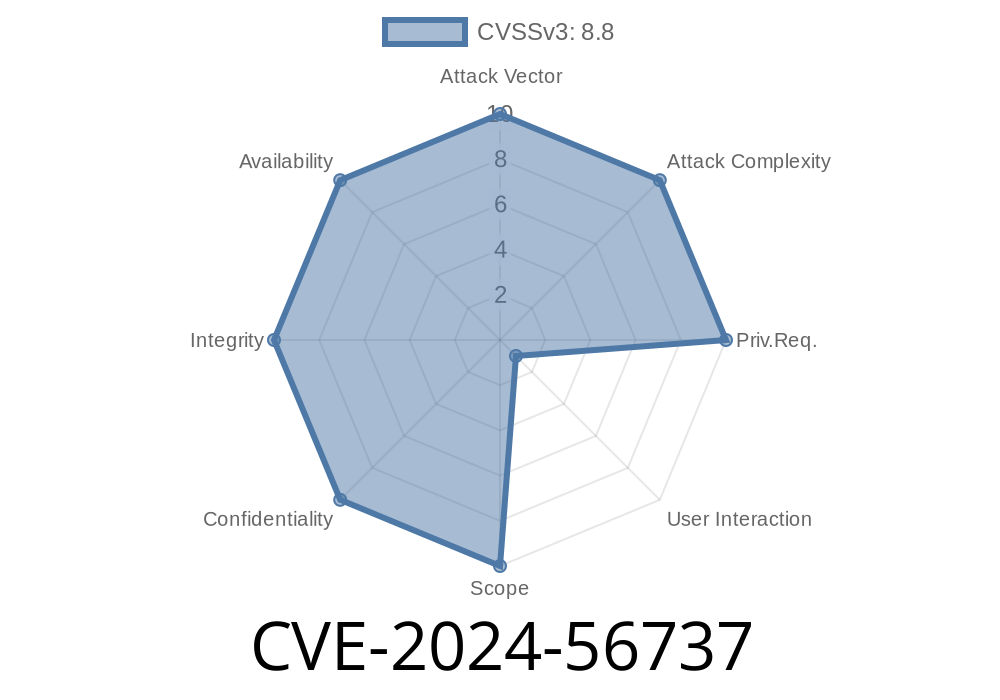CVE-2024-56737 is a recently discovered vulnerability that affects the GNU GRUB bootloader (often just called GRUB2), specifically in the way it handles the Apple HFS filesystem in its file system code. If you’re running GRUB2 version 2.12 or earlier, this affects you. This post will walk through what the problem is, how it works, with sample code, references, how an exploit could be built and why you should care—even if you’re not a developer.
What’s the Danger?
If a attacker is able to trick GRUB into parsing a malicious HFS filesystem, they can trigger a heap-based buffer overflow. Such vulnerabilities can lead to serious consequences, including:
Escalation to arbitrary code execution (ability to run code during boot!)
- Possible persistence/backdooring at the bootloader level
You might think “Nobody uses HFS, right?”, but—since HFS support is built and enabled by default in many Linux distributions—an attacker just needs to get GRUB to read a crafted drive, device, or disk image to exploit this.
Where’s the Flaw?
The bug is in the fs/hfs.c file, which parses HFS filesystems during boot (e.g., if you’re using a Mac-formatted USB drive, or a crafted virtual disk). Specifically, it mishandles the “sblock” (the volume's superblock structure).
Inside GRUB2’s HFS module, GRUB allocates a buffer based on information in the sblock
grub_uint16_t catalog_nodes;
grub_hfs_sblock_t *sblock;
...
sblock = (grub_hfs_sblock_t *)buf;
catalog_nodes = grub_be_to_cpu16 (sblock->cat_nodes);
grub_uint8_t *buf2 = grub_malloc (catalog_nodes * 16);
memcpy (buf2, src, catalog_nodes * 16); // <-- no sanity checking here!
If an attacker manipulates catalog_nodes in the sblock to a huge value, this causes a heap buffer overflow—grub_malloc() cannot prevent memcpy() from blasting too much data.
GRUB Loads Malicious Image:
When the victim’s system boots (or chainboots) and GRUB reads the selection, parsing the HFS filesystem triggers the overflow.
Overflow Triggers Malicious Code Execution:
Careful manipulation allows overwriting heap structures, possibly redirecting code execution to attacker-provided shellcode.
This style of attack is often combined with further escalation, like persistence or even bypassing Secure Boot under some conditions.
Here's a highly simplified demonstration of the essence of the bug
#include <stdint.h>
#include <string.h>
#include <stdlib.h>
struct hfs_sblock {
uint16_t filler[40];
uint16_t cat_nodes;
};
void vulnerable_copy(const uint8_t *data) {
struct hfs_sblock *sblock = (struct hfs_sblock *) data;
uint16_t cat_nodes = sblock->cat_nodes; // attacker controls this
uint8_t *tmp_buffer = malloc(cat_nodes * 16);
// No validation -- overflow possible!
memcpy(tmp_buffer, data + 128, cat_nodes * 16);
free(tmp_buffer);
}
If an attacker sets cat_nodes to a huge value (e.g., xFFFF), the process will overrun the heap buffer, corrupting memory.
Update your GRUB2 packages once a fix is available.
*Track package updates from your distro or* visit the official GNU GRUB page.
- If you have the ability, restrict the use of untrusted storage media and control BIOS/UEFI boot order to prevent booting untrusted devices.
- For distributions: ensure that Secure Boot is enabled. This returns control to the firmware if bootchain components are tampered with, but not all attacks are blocked this way if the bug can be exploited before secure loader checks.
Official CVE Record:
Upstream GRUB2:
https://www.gnu.org/software/grub/
Related GRUB2 Security Issues:
- CVE-202-10713 (Boothole)
- Red Hat Security Advisory on GRUB2
Background on HFS:
Summary
CVE-2024-56737 is a quietly severe bug: a heap buffer overflow in GRUB2’s HFS code that could let a bad actor compromise your system right at boot. The fix is straightforward—validate input and update—but the risk is serious if you ever boot from removable or untrusted media.
Stay patched, stay safe.
If you want more technical details (including a full exploit), keep an eye on security lists as researchers confirm proof-of-concept.
*Share this with colleagues—many people have no idea what threats lurk in their bootloaders!*
Timeline
Published on: 12/29/2024 07:15:06 UTC
Last modified on: 12/31/2024 19:15:48 UTC
